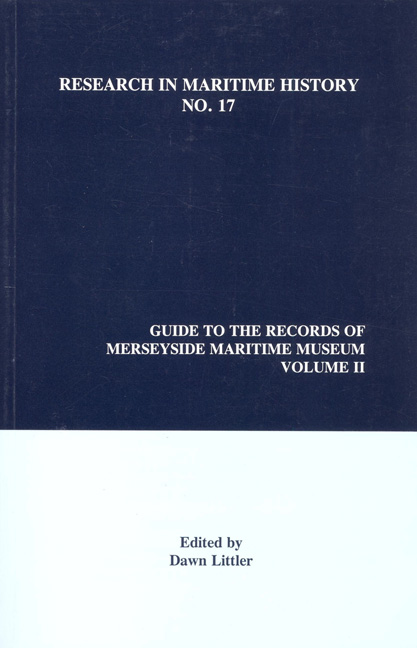Book contents
- Frontmatter
- Contents
- Introduction
- Notes on Access and Use of the Archives
- Acknowledgements
- Notes on the Editor
- List of Illustrations
- Chapter 1 Merchants, Ship Brokers and Agents, Stevedoring and Warehousing Companies
- Chapter 2 Transatlantic Slavery and Slave Trading
- Chapter 3 Emigration
- Chapter 4 Maritime Charities, Missions and Educational Establishments
- Chapter 5 Shipbuilding and Repairing, Engineering and other Maritime Trades
- Chapter 6 Maritime Families
- Chapter 7 Seafarers and Other Individuals
- Chapter 8 Special Collections: Titanic and Lusitania
- Chapter 9 Pictorial and Audio
- Chapter 10 Maritime Library
- Chapter 11 Research, Miscellaneous and Non-Maritime
- Chapter 12 Addenda to Guide, Volume I
- Index
Chapter 2 - Transatlantic Slavery and Slave Trading
- Frontmatter
- Contents
- Introduction
- Notes on Access and Use of the Archives
- Acknowledgements
- Notes on the Editor
- List of Illustrations
- Chapter 1 Merchants, Ship Brokers and Agents, Stevedoring and Warehousing Companies
- Chapter 2 Transatlantic Slavery and Slave Trading
- Chapter 3 Emigration
- Chapter 4 Maritime Charities, Missions and Educational Establishments
- Chapter 5 Shipbuilding and Repairing, Engineering and other Maritime Trades
- Chapter 6 Maritime Families
- Chapter 7 Seafarers and Other Individuals
- Chapter 8 Special Collections: Titanic and Lusitania
- Chapter 9 Pictorial and Audio
- Chapter 10 Maritime Library
- Chapter 11 Research, Miscellaneous and Non-Maritime
- Chapter 12 Addenda to Guide, Volume I
- Index
Summary
Although some individuals, such as Sir John Hawkins, engaged in the slave trade in the sixteenth century, British merchants did not begin large-scale slaving until the 1640s, when a number of private trading companies were established. The London-based Royal African Company, founded in 1663, was the most important of these and from 1672 had a monopoly of the British trade. Other merchants who wanted to enter this lucrative trade opposed the monopoly and it was ended in 1698.
In the early 1700s most of Britain's slave merchants were from London and Bristol. The first Liverpool vessel to enter the slave trade was the Blessing, which sailed for West Africa in August 1700. In subsequent years increasing numbers of ships from Liverpool followed her example to the extent that merchants from the town overtook all other participants. Although London, Bristol and other ports continued to send ships to Africa, Liverpool dominated the trade from about 1730 until its abolition in 1807. Indeed, Liverpool was the European port most involved in slaving during the eighteenth century and was responsible for transporting some one and a half million Africans across the Atlantic.
By the 1730s about fifteen ships a year were leaving Liverpool for Africa and this grew to about fifty a year in the 1750s, rising to just over a 100 in each of the early years of the 1770s. Numbers declined during the American War of Independence (1775-1783) but rose to a new peak of 120-130 ships a year in the two decades preceding the abolition of the trade in 1807. Probably three-quarters of all slaving ships at this latter period left from Liverpool.
Although Liverpool merchants engaged in many other trades and commodities, involvement in the slave trade pervaded throughout the whole port. Nearly all the principal merchants and citizens of Liverpool, including many of the mayors, were involved. Several of the town's MPs also invested in the trade and spoke strongly in its favour in Parliament. Generations of families such as the Tarletons, Cunliffes and Earles organised slaving voyages. The Earle family papers contain substantial references to the family's involvement in the trade, including the log of the Unity on a slaving voyage in 1769-1771.
- Type
- Chapter
- Information
- Guide to the Records of Merseyside Maritime Museum , pp. 29 - 44Publisher: Liverpool University PressPrint publication year: 1999

